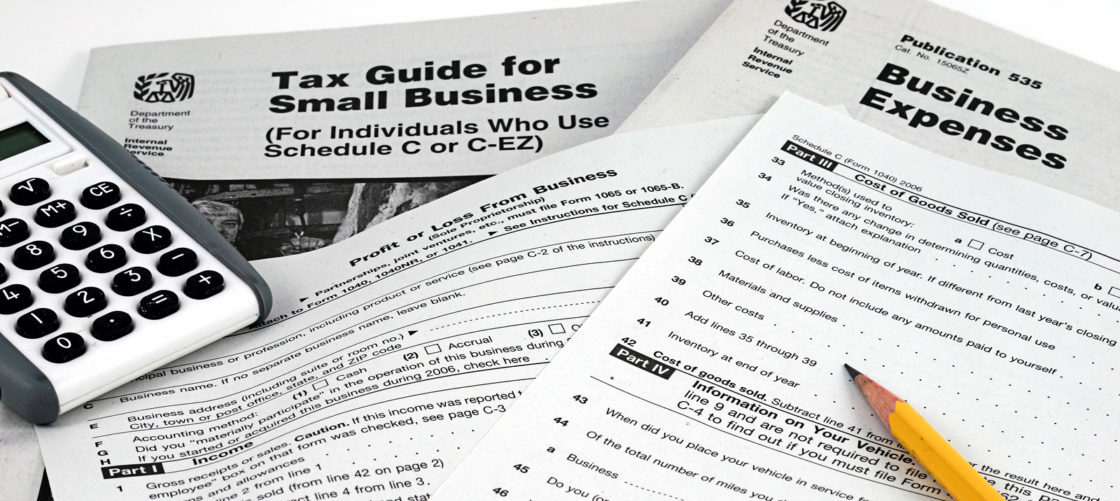Everyone’s favorite time of year—tax time—is right around the corner. And that means the inevitable questions about your business tax write-offs.
As a Business Owner, strategically tackling your taxes is a critical step in ensuring your company’s financial health. In fact, minimizing your business’ tax bill goes a long way to maximizing your 2017 profits. (That’s one reason that it’s so essential that you keep your business and personal finances completely separate.)
So what business tax write-offs are you eligible to take? Which ones are you forgetting? And which have you never heard of at all?
Here are 17 business tax write-offs you may be missing!
Business Tax Write-Offs For Your Office
 1. Home Office Space
1. Home Office Space
It’s true you can get into trouble for claiming this deduction improperly. For instance, if you’re workspace is not truly used exclusively for business. But if your workspace meets the criteria for IRS classification as a home office, definitely take advantage of this awesome deduction!
You can choose to itemize or deduct $5/sq.ft. to simplify your recordkeeping. Either way, if you qualify, this tax break will definitely save you a ton.
2. Utilities
If you have a dedicated office space or a bona fide home office, you can absolutely deduct the portion of utilities you pay that go toward supporting that space. And don’t forget your security system, cleaning supplies or service, insurances and permits.
3. Your Set-Up
Bought a desk for the office? A file cabinet? How about a computer, software or apps for work purposes? Deduct them!
Business Tax Write-Offs For Your Clients
4. Schmoozing
Business meals & entertainment are typically 50% deductible. And gifts to your clients are also deductible up to a specified dollar amount.
5. Bad Debts
So you have a deadbeat customer who won’t pay. If you’ve given up the fight, you can claim that lost income as an uncollectible debt on your tax return.
 Business Tax Write-Offs For Your Employees
Business Tax Write-Offs For Your Employees
6. Salaries
Whatever you pay your employees is tax deductible. But so are the fees you pay to freelancers, your lawyer, an accountant and other professionals you hire to handle business-related tasks.
7. Recruitment Costs
Did you pay a recruiter to find you a new hire? Post a job ad on a paid board? Keep track of the costs associated with landing new employees for tax purposes.
8. Employee Insurance
If you offer benefits like health insurance, dental insurance and group life insurance, your contributions on behalf of your employees are tax-deductible. And, if you’re self-employed and pay with after-tax money for your own insurance premiums, be sure to deduct that expense. The only time this doesn’t apply is if you purchase from your state’s exchange.
9. Retirement Contributions
As an employer, you’re can deduct contributions you make to your employees’ qualifying retirement plans. Solopreneurs, remember that you’re your own employer! So you get to claim deductions for your solo retirement plan.
10. Payroll Taxes
So if you have at least one employee—even if it’s just you!—there are certain taxes you have to pay. And you can deduct the employer’s share of Social Security, Medicare and unemployment taxes that you cover.
11. Training & Education
Because whether you sent your employee to a professional seminar or you signed yourself up for an online course, you can tally up those tuition costs for your taxes.
Business Tax Write-Offs For Fees, Fees & More Fees
12. Startup Costs
Did you just start your business? If so, the IRS wants to reward you for getting off the ground by allowing you to deduct up to $5000 of your startup costs on your tax return!
 13. Advertising Expenses
13. Advertising Expenses
Advertising doesn’t mean just online ads, flyers and radio spots. Consider the costs for your website, logo design, business cards, social media, e-mail list service provider and more.
14. Industry Fees
Does your business have to shell out for required regulatory fees? Do you or your employees need to maintain certain licenses or certifications? The costs to cover all of that are generally deductible.
15. Convenience Fees
If you’re paying fees every time you swipe a credit card or receive a PayPal payment, don’t worry. Those fees are all deductible.
16. Insurance Premiums
Business-related insurance costs are 100% deductible. So add up the costs of your liability, workers’ compensation, property, errors & omissions and other applicable insurance payments. And if you have a home office, your home office percentage applies here as well.
17. Travel Costs
Traveling to a conference or client site? Deduct the cost of your cab, train ride or airfare. And if you’re driving for business, keep track of your mileage driven. It’s tax deductible as well.
image credit: Bigstock/schecky
Dr. Tony is the co-founder of MindShift.money and the best-selling author of three books on personal and business finances. Having achieved Financial Freedom at 27, Dr. Tony believes that through Financially Fit Bootcamp and Cash Flow Cure everyone can get there. He has made it his life’s mission to help others live a life where their money works for them—not the other way around.
